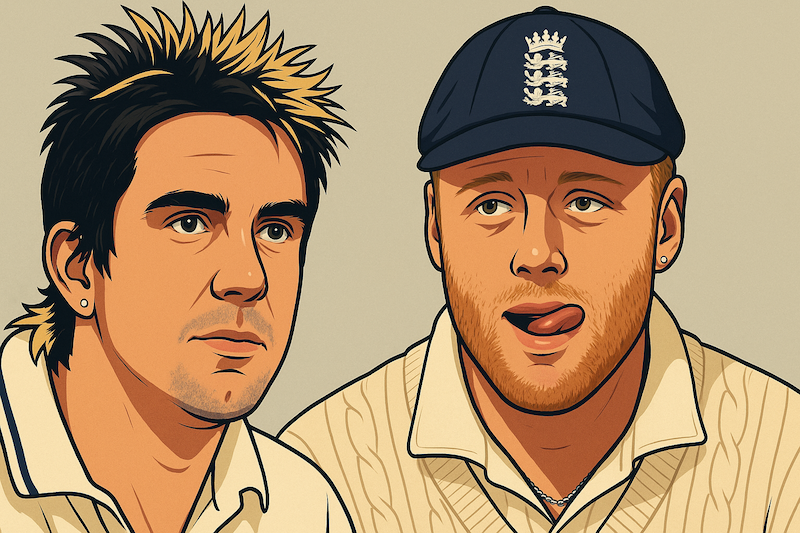
In the 1990s and early 2000s, when cricket was full of all-round stars, few shone brighter for New Zealand than Chris Cairns. With the ability to swing the ball both ways and change a match in an hour with the bat, he was more than an all-rounder — he was often the difference between New Zealand competing and New Zealand winning.
Early Life and Rise
- Born into a cricketing family, he inherited the game from his father Lance Cairns, who also represented New Zealand.
- He began as a promising fast bowler before developing into a genuine all-rounder, capable of winning matches with both bat and ball.
- His international debut in 1989 came just after Richard Hadlee’s retirement, with hopes that he could help restore balance to the team.
- Early performances showed flashes of his talent, as he quickly cemented his place with contributions in both disciplines.
- He carried forward his father’s reputation for fearless six-hitting, but combined it with greater patience and refined technique.
The All-Rounder’s Impact
- He was renowned for swinging the ball both ways, a skill that made him especially dangerous in New Zealand’s seaming conditions.
- With the bat, he was both destructive and adaptable — equally capable of steadying the innings after collapses or finishing matches with brutal power.
- Captains valued him as a partnership-breaker, turning to him when frontline bowlers struggled, and he often delivered key breakthroughs.
- Widely regarded as one of the cleanest strikers of the cricket ball in his generation, his six-hitting became a hallmark of his batting.
- He achieved the rare Test all-rounder’s double of 200 wickets and 3,000 runs, placing him among the game’s elite multi-skilled cricketers.
Defining Moments
- In the 2000 ICC KnockOut Trophy final, Cairns played the innings of his life — an unbeaten 102 that powered New Zealand to their first-ever ICC trophy, chasing down India in a historic final.
- During the 2001-02 VB Series in Australia, he was New Zealand’s standout performer, finishing as the team’s top run-scorer and second-highest wicket-taker, carrying them all the way to the finals despite battling injury.
- His Test career featured several defining knocks, none bigger than his counterattacking 158 against South Africa in 2004, which showcased his ability to rescue New Zealand from tough positions.
- On the bowling front, he produced a memorable spell of 6 for 77 at Lord’s in 1999, a performance good enough to etch his name onto the famous Lord’s Honours Board.
- In recognition of his match-winning consistency, he was named one of Wisden’s Cricketers of the Year in 2000, underlining his standing as one of the finest all-rounders of his generation.
Explore More Stories

2005 Ashes: The Summer Cricket Became Theatre
The 2005 Ashes was more than just a cricket series. It was a rollercoaster of emotion, courage, and unforgettable moments that brought Test cricket back to life. England’s long wait finally ended, and the world watched history unfold.

What Happened to Zimbabwe Cricket? The Rise, Fall, and Fight for Survival
Once they challenged the world’s best, now they struggle to stay afloat. Zimbabwe cricket’s journey from the glory of 1999 to years of chaos and heartbreak is a story of politics, power, and lost pride, and of a nation still dreaming of revival.
Injuries and Challenges
- Persistent knee and back problems haunted his career, forcing him to miss over 50 Tests and limiting his ability to build the monumental numbers his talent promised.
- Even through the pain, Cairns often delivered in big moments — most memorably his century in the 2000 ICC KnockOut Trophy final, which he played while battling a serious knee injury.
- After back surgery reduced his pace, he reinvented himself by mastering a deceptive slower ball, proving his adaptability in the face of physical setbacks.
- His post-cricket life has been marked by enormous health struggles, including a life-threatening aortic dissection in 2021, a spinal stroke that left him paralyzed from the waist down, and a bowel cancer diagnosis in 2022.
Career Totals
| Format | Matches | Runs | Average | Centuries | Wickets |
|---|---|---|---|---|---|
| Tests | 62 | 3,320 | 33.53 | 5 | 218 |
| ODIs | 215 | 4,950 | 29.46 | 4 | 201 |
Career Highlights
- Reached the elite Test all-rounders’ double of 3,000+ runs and 200+ wickets in just 58 Tests — the 3rd fastest in history behind Ian Botham and Kapil Dev.
- Achieved career-best Test bowling figures of 7/27 against the West Indies in 1999, one of New Zealand’s finest spells.
- Became the second player in ODI history to score a century in his 100th match (vs India, 1999), and the first to do so in a winning cause.
- Once held the world record for most sixes in Test cricket (87) at the time of his retirement.
- Owned a superb Test record at No. 7 — his batting average (44.02) ranks among the best all-time for that position.
- Wisden Cricketer of the Year (2000).
- Appointed Officer of the New Zealand Order of Merit (ONZM) in 2005 for services to cricket.
- Player of the Match in the 2000 ICC KnockOut Trophy final, leading New Zealand to their first ICC title.
- Named New Zealand Cricket Almanack Player of the Year for three consecutive years (1998, 1999, 2000).
- Widely regarded as one of New Zealand’s finest all-rounders, celebrated for his match-winning impact with both bat and ball.
Farewell and Legacy
Chris Cairns retired in 2004, leaving behind the image of a true match-winner — a batsman who could clear the ropes with ease and a bowler who could break partnerships at will. His century in the 2000 ICC KnockOut Trophy final remains one of New Zealand’s greatest cricketing moments.
For a nation built on resilience, Cairns embodied both grit and flair. He will be remembered as the all-rounder who gave New Zealand belief against the world’s best.
















